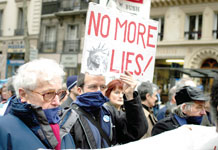Anti-war protesters join together in Paris to voice opinion about Bush and the war

Tony Paschall, second from the left, marches with other members of Americans Against the War-France on March 20 in Paris. The bandanas worn by the members symbolize the Bush Administration. Protesters believe the Bush Administration is gagged from telling the truth to the American people.
Once the site of a political prison, the politics around the Bastille have changed to modern-day protests.
Approximately 2,500 people crowded near the site of the Bastille March 20 in Paris to peacefully protest the continued American occupation of Iraq, joined by others from around the world.
Americans Against the War-France organized the event, attended by many other groups that also feel strongly against the war.
AAW was founded in October 2002 and has approximately 200 members.
“When there’s a big demonstration, there are people that know us, and they find us,” said Mark Cramer, a founding member of AAW. “We’ve had as many as 400.”
“In France, the custom is to participate with other groups that all organize together – you have human rights groups, civil rights groups, things like that.”
The war on terror is a good thing, said Tony Paschall, a member of AAW.
“But, I’ve lived in different places in Paris for 20 years and three times within that period bombs have gone off within 400 meters of my home,” he said.
“I’ve seen how the French deal with terrorism, whether it’s right-wing extremist terrorism or left-wing extremist terrorism, and I know that the approach Bush is taking is not the right one.”
Cramer agrees the war on terror is noble but believes it has been taken the wrong way by the American government.
“You also have to think that the Europeans have been fighting terror long before the Americans,” he said. “The Europeans should have been consulted on this because you have to think, ‘is it the right thing to do bombs?'”
He also compares the terrorism problem with the mafia that was prevalent in the 1930s-1950s.
“Do we go bomb Sicily because the mafia was coming from Sicily?” Cramer said. “They stopped it (the mafia) by the IRS – they found some smart way of doing it, and now we don’t have to deal with the mafia anymore.”
Cramer also points out every type of terrorism is different, so you must put together the best plan for protection as to avoid killing people who have nothing to do with terrorism.
The group focused on the idea of “no more lies” for the march. Many members wore bandanna “gags” symbolic of the fact they believe President George W. Bush’s administration is gagged when it comes to speaking truth.
“The main lie is that the war was justified because there were weapons of mass destruction,” Cramer said. “We’ve heard from Scott Ritter who was the head investigator from Iraq – we had him as a guest speaker – so we knew in advance they were not going to find much if anything of weapons of mass destruction.
There was plenty of evidence that there was none. The second [lie] was that Iraq had something to do with terrorism, with Sept. 11.”
Cramer said the second lie was Iraq had something to do with the 9-11 terrorism.
“They knew they were lying because they didn’t actually say it strait out,” he said. “Whenever they had a sentence talking about 9-11, they would always mention Saddam Hussein in the same sentence. They didn’t really say that he did it, but if people are listening and they constantly hear it, it’s an old public relations trick.”
Protests can be quite common in the United States, but also in France, Paschall said.
“The French love us and we like being out with the French,” he said. “We get a lot of positive response from American visitors here so we just want to make it known that there are American’s who oppose Bush’s illegal war.”
Paschall sees no difference in his attitude toward protest, be it in France or the United States.
“But I do think it would be better if we were doing this protest in the States instead of here,” Cramer said.
“France is a very free country; we have no problem in France.”
Tamzin Jans, another member of AAW France, said France is “a very tolerable country” where protests are concerned.
“France is absolutely the kind of place where protest and dissent is perfectly accepted – you can even go in a pub and talk to people who have a difference in opinion and no one’s going to stop you or beat you up because you have a difference of opinion, which can happen in other places,” she said.
Your donation will support the student journalists of Missouri Southern State University. Your contribution will allow us to purchase equipment and cover our annual website hosting costs.



























